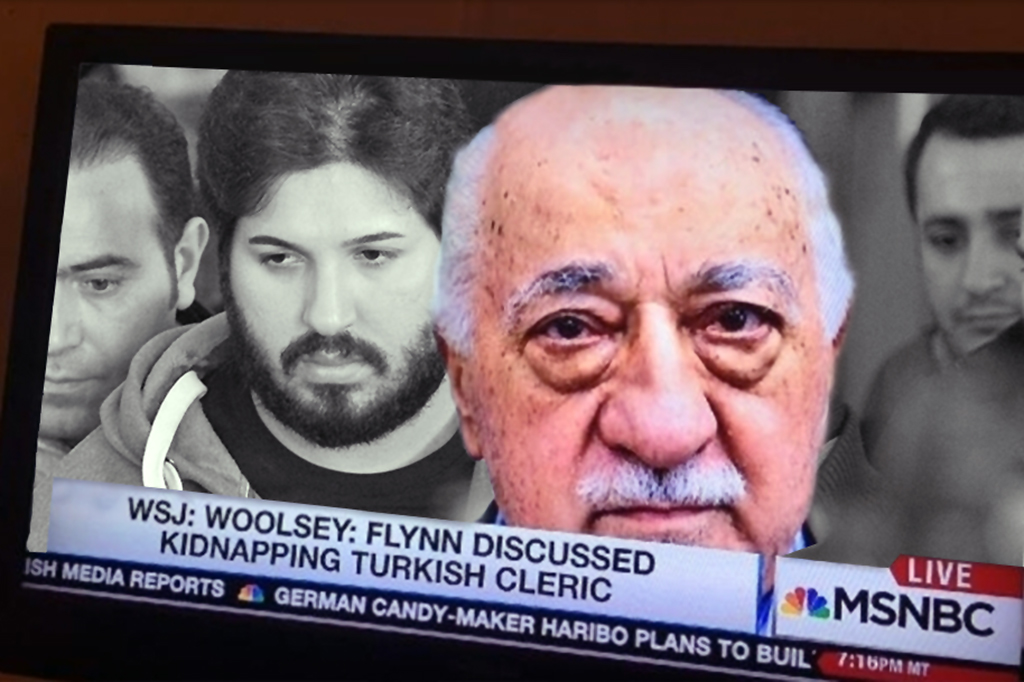
Gülenists' role in Zarrab, Atilla cases
Gülenist terrorists try to do all they can to interfere in the Attila and Zarrab cases with the aim to harm Turkey
Share
The trial of Mehmet Hakan Atilla, the former deputy general manager of Halkbank, who has been charged with conspiring to violate U.S. sanctions on Iran, is looking more and more like a show. Reza Zarrab, the trial's former chief defendant, has recently become a witness for the prosecution.
On his best behavior, Mr. Zarrab has been informing the judge and members of the jury on "money-laundering" methods by drawing charts. Among the most passionate followers of the show are members of the Gülenist Terror Group (FETÖ). After all, some of their "brothers," including former Gülenist police chiefs who smuggled "the files" into the United States, will take the stand as witnesses.
From their perspective, a U.S. federal court has just created an environment in which the charges brought against the Turkish government by the Gülenists as part of the Dec. 17 and Dec. 25, 2013, judicial coups can be accepted as fact.
As such, it is high time for FETÖ members to start making the case that Dec. 17 and Dec. 25 were indeed an anti-graft operation, whereas the July 15 coup attempt was a "controlled coup" by the Justice and Development Party (AK Party) government. In other words, Gülenists believe they can absolve themselves from the charges of conspiring against Turkey and carrying out a coup attempt in that country.
Regardless of the course that the Atilla trial will take, however, the Turkish people have already branded the Gülenists as coup plotters who shall never again be allowed to operate in Turkey. Meanwhile, the politically-charged trial fits into a different context from the U.S. perspective.
The U.S. government, which has chosen to admit since 2013 that undermining Turkish interests was incompatible with its alliance with Turkey, has opted to make the Atilla case look like it is about violation of U.S. sanctions alone.
Next week, the cross-examination of witnesses and the statement of Mr. Atilla's attorney will make it clearer which direction the trial will take. The defense maintains that even the collection of "evidence" has been done illegally. However, the course of the trial thus far suggests that it served multiple agendas at once. First, the United States Government appears to be building a case against Halkbank to fine the Turkish bank for violating U.S. sanctions on Iran. At the same time, Washington is using the case to establish beyond reasonable doubt that it is pretty serious about its strategy to contain Iran. Meanwhile, Reza Zarrab's testimony has provided ample material to kick start a "corruption" debate in Turkish politics.
In recent weeks, the main opposition Republican People's Party (CHP) leader Kemal Kılıçdaroğlu "unveiled" fake documents in an effort to ride this new wave of "corruption" allegations. He sought to mount pressure on the government by making baseless claims against President Recep Tayyip Erdoğan and members of his family. One thing is clear: the smear campaign, which the Turkish people were able to overcome in December 2013 through public debate, will not yield the desired results four years later. The Turkish people know that the Dec. 17 and Dec. 25 judicial coup attempts marked the first step toward the July 15 coup attempt.
At the same time, the public understands perfectly well that both the United States and the European Union turned their backs on Turkey as the country fought terrorist groups, including the PKK and FETÖ. While the U.S. government refuses to take action against Fetullah Gülen and his militants, citing the inadequacy of evidence provided by Turkey against them, it is curious to see that a federal court has been putting Turkish citizens on trial based on "evidence" doctored by Gülenists themselves.
To make matters worse, the Atilla trial has seriously damaged Turkey-U.S. relations and America's image in Turkey. In recent years, Washington provided plenty of rhetorical ammunition to those who argued that the United States was an enemy of the Turkish people. In turn, the people who stress the importance of Turkish-American friendship find themselves silenced by the facts. Future generations will undoubtedly see Washington's support for the People's Protection Units (YPG) militants, its decision to aid and abet Gülenists and its efforts to fine Halkbank as grave mistakes that fueled anti-Americanism in Turkey.
One way or another, the Turkish people will reach the conclusion that Gülenists were trying to protect U.S. interests all along – which will also answer the question why FETÖ desperately tried to take down the Erdoğan administration at a time when it controlled most of Turkey's strategic offices. The people will conclude that the entire case, from its judge to witnesses, from it experts to evidence, was patented by FETÖ – or, should I say, that everything that FETÖ did in recent years were sanctioned by the United States government.
[Daily Sabah, 8 December 2017]
Tags »
Related Articles







